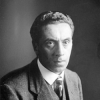Ernst Toller

Ernst Toller
Ernst Tollerwas a German left-wing playwright, best known for his Expressionist plays. He served in 1919 for six days as President of the short-lived Bavarian Soviet Republic, and was imprisoned for five years for his actions. He wrote several plays and poetry during that period, which gained him international renown. They were performed in London and New York as well as Berlin. In 2000, several of his plays were published in an English translation...
NationalityGerman
ProfessionPlaywright
Date of Birth1 December 1893
CountryGermany
Slogans which deafened us so that we could not hear the truth.
And suddenly, like light in darkness, the real truth broke in upon me; the simple fact of Man, which I had forgotten, which had lain deep buried and out of sight; the idea of community, of unity.
one does not remember one’s own pain. It is the suffering of others that undoes us
The human brain cannot encompass total absence. Like infinity, it is simply not something that the organ runs to. The space someone leaves must be filled, so we dream forever of those who are no longer here. Our minds make them live again.
At the end of our lives it is our loves we remember most, because they are what shaped us. We have grown to be who we are around them, as around a stake.
Betrayal clearly has its own reward: the small deep human satisfaction of having one up on someone else. It is the psychology of the mistress, and this regime used it as fuel.
Can you rework your past, the grit that rubs in you, until it is shiny and smooth as a pearl?
Per capita the East Germans drank more than twice as much as their West German counterparts.
The cynic sees only cynicism, the depressive can taint creation with one glance
We don't catch hold of an idea, rather the idea catches hold of us and enslaves us and whips us into the arena so that we, forced to be gladiators, fight for it.
I had very good eyes once. Though it's another thing to say what I saw. In my experience, it is entirely possible to watch something happen and not to see it at all.
For anyone to understand a regime like the GDR, the stories of ordinary people must be told. Not just the activists or the famous writers. You have to look at how normal people manage with such things in their pasts.
I wonder, now, about interrogation chambers: why do they think bright light brings the truth out of people? They should try the seduction of shadows, where you cannot watch your words hit their target.
I am a woman on her way to eat cake.